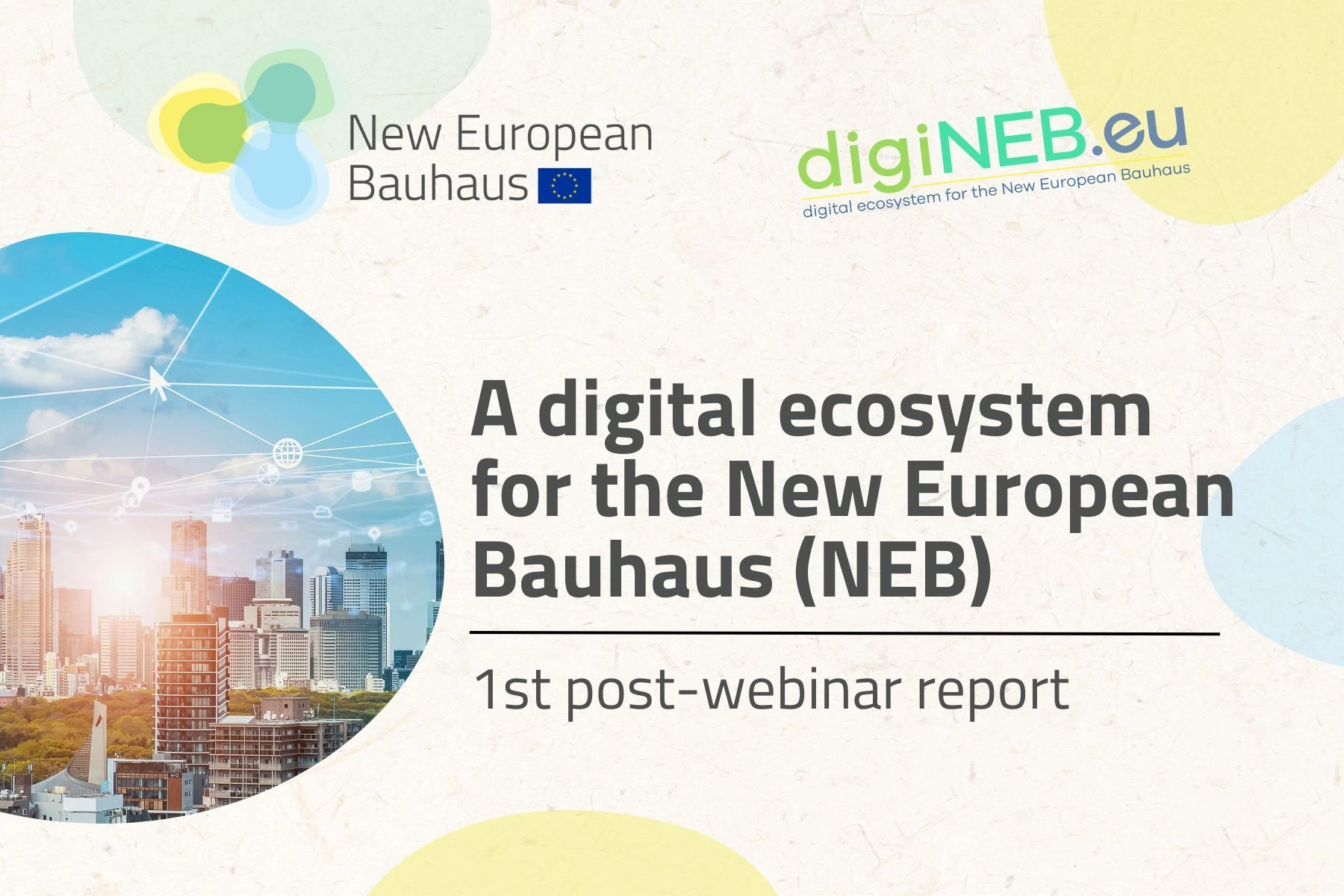A digital ecosystem for the New European Bauhaus - First Post-Webinar Report
The first webinar of the digiNEB.eu project "Digital ecosystem for the New European Bauhaus (NEB)" took place on 12 December 12, 2022, with high-level representatives of the European Commission, digiNEB.eu project members and experts in both digital and NEB ecosystems discussing the role of digital technologies in accomplishing NEB’s main pillars of sustainability, aesthetics and inclusion.
The event was moderated by Silvana Muscella (CEO, Trust-IT Services), who opened the webinar and invited attendees to join the NEB ecosystem by contributing to digiNEB.eu’s offer. Potential initiatives include proposing solutions for the Digital Toolkit, sharing a success story for the Observatory, contributing to the eLearning catalogue, joining Thematic Working Groups and becoming Early Adopters of the NEB digital ecosystem.
The New European Bauhaus initiative: beautiful, sustainable, together - The EU Roadmap
The webinar’s first part briefly introduced the New European Bauhaus, featuring two European Commission representatives who outlined NEB’s main principles and discussed digiNEB.eu potential contribution:
- Alicja Magdalena Herbowska (New European Bauhaus acting Head of Unit, Joint Research Centre) outlined NEB’s main principles and its current and future roadmap initiatives;
- Eddy Hartog (European Commission DG Connect, Head of Unit Technologies for Smart Communities) reinforced some points raised by Alicja Magdalena, explaining how digiNEB.eu can play a key role in contributing to local digital transformations (e.g. local dataspaces and digital twins), knitting together key strategic points on EC’s agenda: green transformation and digital technologies.
The Role of the digital ecosystem in the construction industry
The webinar’s second part prioritised the role of the digital ecosystem in the construction industry, featuring Jesús Angel García Sánchez (of the ECTP Executive Board on Digital Built Environment). Jesús remarked on the importance of the built environment sector, which represents 9% of Europe’s GDP. He focused particularly on the sector's digitalisation, discussing different applications, such as smart metre deployment, IT-based energy solutions, digital twins for scenario forecasting and building fine-tuning, building retrofit, organisation of worksites, and solutions for elderly people’s comfort.
User stories across Europe
The third part of the webinar focused more specifically on digiNEB.eu, with some examples of user stories across Europe. The first speaker, digiNEB.eu’s partner Roberto Cavallo (Council member of the European Association for Architectural Education), illustrated the project’s Early Adopters campaign looking for people and best practices making use of digital solutions in order to contribute to NEB. He also introduced the first solution, the Duvet project, representing digiNEB.eu.
Jan Åman (Senior Researcher at Industry Commons Foundation) described more in-depth the Duved project. Duved is a small little village in the North of Sweden, which became a litmus test to understand and try potential planning solutions, to address some of the world’s major challenges. The project’s main aim is to overcome the centralised and top-down industrial factory model, promoting the idea of an ecosystem society addressing key global (climate change, war) and local challenges, upcycle democracy, housing system, food waste, smart mobility, knowledge production, and artisanal housing.
Panel Discussion - Present and future of digital solutions for NEB
The panel discussion aimed at bringing together three experts of the NEB ecosystem: Michela Magas (Chair at Industry Commons Foundation and member of the NEB High-Level Roundtable, Ruth Schagemann (President of the Architects’ Council of Europe) and Jan Åman, who shared their experiences to showcase:
- how NEB digital solutions can facilitate and accelerate the transition to climate-neutral cities;
- practical examples of how digitalisation practices can contribute to applying NEB principles.
The main highlights, discussions and results from the webinar are summarised in a post-webinar report, freely downloadable on Zenodo.
